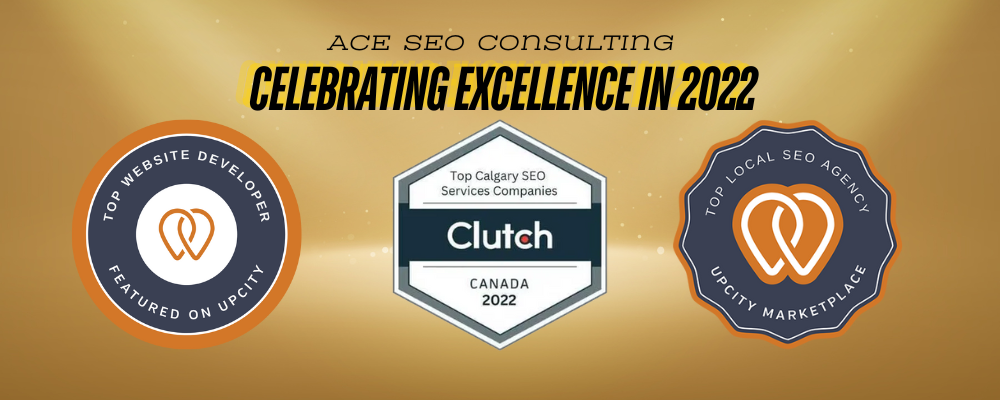Blog

We're absolutely thrilled to announce that we've been honored with the prestigious UpCity 2024 Excellence Award! Since our inception, our team at Ace SEO Consulting has been dedicated to pushing boundaries, delivering exceptional results, and prioritizing the success of our clients. This award is a testament to our unwavering commitment to excellence and relentless pursuit of innovative digital marketing strategies. Winning the UpCity 2024 Excellence Award is a tremendous achievement for us, and it reaffirms our position as a trailblazer in the dynamic world of digital marketing. This recognition speaks volumes about our team members' hard work, dedication, and expertise,as they consistently go above and beyond to exceed client expectations. At Ace SEO Consulting, we specialize in helping businesses enhance their online visibility, attract more organic traffic, and achieve measurable results with our Calgary SEO services. Whether through strategic SEO tactics, captivating web design , or engaging social media marketing campaigns, we're passionate about driving tangible business outcomes for our clients. Our focus on delivering top-notch services extends to every aspect of our work. From conducting in-depth keyword research and implementing on-page optimization strategies to crafting visually stunning websites and creating compelling social media content, we're committed to excellence in everything we do. In addition to celebrating this remarkable achievement, we're excited to share the news of our success with our clients, partners, and industry peers. Winning the UpCity 2024 Excellence Award is not just a milestone for us; it's a testament to the trust and confidence that our clients place in us to help them achieve their goals. As we continue our journey, we remain steadfast in our commitment to innovation, growth, and delivering exceptional client results. With the UpCity 2024 Excellence Award under our belt, we're more motivated than ever to push the boundaries of what's possible in digital marketing and lead the way toward a brighter future for our clients and our industry. Thank you to UpCity for this incredible honor, and thank you to our clients for trusting us with their digital marketing needs. We look forward to continuing to exceed your expectations and help you achieve even greater success in the future. We Share Our Success: Ace SEO Consulting's Press Release We have also published a press release to spread the word about our recent achievement of winning the UpCity 2024 Excellence Award. This press release is an official announcement to inform our customers, partners, and industry peers about our dedication to delivering top-notch digital marketing services and our commitment to client success.

The 5 Local SEO Strategies That Have Been Proven To Actually Work in 2023 is a set of well researched SEO strategies from reputable SEO Companies tactics that local businesses can use to improve their online presence and visibility in search results. These SEO strategies include optimizing Google My Business listing, creating high-quality content, building backlinks from authoritative websites, getting listed in local directories, and using social media to engage with customers. By implementing these tactics, local businesses can improve their website and web pages search engine rankings, attract more website visitors, and ultimately drive more traffic and sales to their business.

In the fast-paced world of digital marketing, achieving visibility and relevance on search engines is paramount for businesses. This is where ACE SEO Consulting shines. With our innovative strategies and dedication to excellence, we've emerged as a trusted partner for companies seeking to enhance their online presence. Setting the Standard for Digital Marketing Excellence Discover how ACE SEO Consulting has become a leading force in digital marketing , earning the prestigious 2022 Consumer Choice Award in Southern Alberta for our exceptional achievements and unwavering commitment to client success. 1. The Importance of SEO A strong online presence is crucial for success in today's competitive landscape. With countless websites competing for attention, businesses must ensure their desired audience easily finds them. This is where SEO becomes invaluable. By optimizing their websites for search engines, companies can enhance their visibility, attract visitors, and drive increased leads and sales. 2. Why Choose ACE SEO Consulting? Our unwavering commitment to delivering results differentiates us from other digital marketing agencies . With a team of experienced professionals and a proven track record of success, we've earned clients' trust across various industries. Whether it's increasing website traffic, improving conversion rates, or boosting online sales, we have the expertise to help businesses achieve their goals. 3. Consumer Choice Award In recognition of our outstanding achievements, ACE SEO Consulting was awarded the prestigious Consumer Choice Award in 2022. This accolade is a testament to our dedication to excellence and customer satisfaction. By consistently delivering exceptional results, we've earned the admiration and respect of our peers and clients. 4. How ACE SEO Consulting Stands Out Our innovative approach and customer-centric philosophy distinguish us from other digital marketing agencies. We take the time to understand each client's needs and tailor our strategies accordingly. Whether developing custom SEO campaigns or providing ongoing support and guidance, we go above and beyond to ensure client success. 5. Client Testimonials The accurate measure of a company's success is in the satisfaction of its clients. ACE SEO Consulting has garnered positive reviews from clients who have directly experienced the benefits of our services. Whether small enterprises or multinational corporations, our clients consistently applaud our professionalism, expertise, and results-oriented methodology. 6. Expert Team At the heart of our success is our team of dedicated professionals. Comprising seasoned SEO experts , content creators, web developers, and digital marketers, our team brings knowledge and experience to every project. With our combined expertise and collaborative spirit, we deliver tailored solutions that drive tangible results. 7. Local Impact As a proud member of the Southern Alberta community, ACE SEO Consulting is committed to making a positive impact both locally and globally. Through our work with local businesses and organizations, we strive to foster growth, innovation, and prosperity in the region. By supporting community initiatives and giving back to those in need, we demonstrate our commitment to social responsibility and corporate citizenship. 8. Future Plans and Expansion Looking ahead, ACE SEO Consulting has ambitious plans for growth and expansion. With a commitment to innovation and ongoing refinement, our goal is to elevate our services and capabilities to address our clients' ever-changing requirements. By broadening our scope and diversifying our solutions, we are poised to strengthen our standing as a frontrunner in digital marketing. Conclusion ACE SEO Consulting is a trusted partner for businesses looking to enhance their online presence and achieve digital marketing goals. With our innovative strategies, experienced team, and proven track record of success, we've earned a reputation as a leader in the industry. ACE SEO Consulting has the expertise to deliver results, whether it's increasing website traffic, improving search engine rankings, or driving online sales.

At ACE SEO Consulting , we are thrilled to announce our recognition for excellence in the digital marketing industry in 2022. Our commitment to delivering excellent results has been acknowledged by reputable platforms, solidifying our position as a leader in the field. Recognitions and Accolades in 2022 In 2022, ACE SEO Consulting proudly received the following prestigious recognitions and accolades in the digital marketing industry: 1. Clutch Recognition: Top Calgary SEO Company in Canada We are honoured to have been named one of the Top Calgary SEO Companies in Canada by Clutch. This prestigious recognition underscores our expertise in enhancing online visibility and driving organic business traffic, showcasing our dedication to achieving tangible results for our clients. 2. UpCity Marketplace Accolade: Top Local SEO Agency Additionally, we are proud to have received recognition as a Top Local SEO Agency on UpCity Marketplace. This accolade highlights our focus on serving local businesses and assisting them in succeeding in the competitive digital landscape, further reinforcing our commitment to client success. 3. Top Website Developer Recognition Furthermore, we are delighted to be featured as a Top Website Developer on UpCity. This acknowledgment demonstrates our proficiency in providing comprehensive digital marketing solutions , including creating engaging websites that effectively convey our clients' brand messages and drive results. 4. The Benefits of Awards: A Testament to Excellence The awards we have received serve as a testament to our ability to deliver impactful strategies for our clients. They recognize our achievements and validate the effectiveness of our approaches and their positive impact on our clients' businesses. 5. Impact on Reputation: Building Trust and Credibility Receiving awards from esteemed platforms enhances our reputation and credibility in the industry. It showcases to potential clients that we are a trusted partner capable of achieving tangible outcomes and fostering business development. 6. Client Testimonials: Real Results, Real Satisfaction Our success is mirrored in the testimonials of contented clients who have directly experienced the advantages of our services. Fahad, a pleased client, remarks, " Our experience with Ace and Ace SEO Consulting's whole team was terrific. They were detailed and attentive to our website design and provided the best local Calgary SEO solutions . With this new web design, we can do more fundraising, and our non-profit organization is reaching more people than ever." 7. Continued Commitment to Excellence As we continue to grow and evolve, we remain dedicated to upholding the highest standards of quality and excellence. These awards recognize our past achievements and motivate us to strive for even greater success in the future. Conclusion The awards we received in 2022 speak volumes about our dedication, expertise, and steadfast commitment to client success. From being recognized as one of the Top Calgary SEO Companies in Canada by Clutch to earning accolades as a Top Local SEO Agency and Top Website Developer by UpCity, these achievements highlight our excellence in digital marketing. As we look towards the future, ACE SEO Consulting remains committed to leading the way in helping businesses achieve their online marketing goals.

The 2021 year marks the inaugural UpCity“ Best of” awards honoring the top providers around the world in specific service categories based on their “ Recommend ability Rating ”. The UpCity Recommend ability Rating was developed to determine a B2B service provider’s credibility and trustworthiness , giving UpCity the confidence to recommend them to those businesses seeking services.

Standing out is crucial in today's digital age, where the online landscape is crowded and ever-changing. ACE SEO Consulting has stood out and excelled, clinching the prestigious 2021 Consumer Choice Award in Southern Alberta. This recognition highlights ACE's dedication to excellence and its ability to deliver outstanding client results. ACE SEO Consulting: Leading the Way in Digital Excellence Discover why ACE SEO Consulting stood out and received the Consumer Choice Award 2021 in Southern Alberta. 1. Why ACE SEO Consulting Stands Out At ACE SEO Consulting, we've earned our reputation as a trailblazer in search engine optimization through our unwavering dedication to client success. With a team of seasoned experts, we go above and beyond to ensure our clients' online visibility and growth. We consistently deliver outstanding outcomes by staying ahead of the curve and leveraging the latest SEO techniques. 2. The Importance of SEO in Today's Market In today's digital age, where consumers rely on search engines for everything from product evaluations to discovering local businesses, the importance of SEO cannot be emphasized enough. It's not solely about securing a higher rank in search results; it's about establishing connections with your intended audience and fostering meaningful engagement. At ACE SEO Consulting , we understand this fundamental truth and work tirelessly to empower businesses with the tools they need to thrive in the digital landscape. 3. Holistic SEO Strategies for Maximum Impact What sets ACE SEO Consulting apart is our holistic approach to SEO. It's not just about optimizing keywords or tweaking meta tags; it's about crafting comprehensive strategies, including every aspect of a client's online presence. From conducting thorough audits to identify areas for improvement to developing tailored solutions that align with each client's unique goals, we leave no stone unturned in our pursuit of excellence. 4. The Consumer Choice Award: A Testament to Excellence Receiving the Consumer Choice Award is no small feat—it's a testament to a company's unwavering commitment to quality and customer satisfaction. Our win reflects our dedication to going above and beyond for our clients, ensuring they meet and exceed their digital marketing objectives. It's a testament to our pursuit of excellence and ability to deliver results that make a real difference. 5. Comparative Analysis ACE SEO Consulting stands out from its competitors due to our personalized approach, proven track record, and commitment to client satisfaction. Our innovative strategies consistently outperform industry standards, making us the preferred choice for businesses looking for digital marketing solutions . Conclusion ACE SEO Consulting remains a beacon of excellence and innovation in a constantly evolving digital landscape. Our recent accolade as the 2021 Consumer Choice Award winner in Southern Alberta reaffirms our position as a leader in search engine optimization. By prioritizing client success and staying ahead of the curve, we continue to set the standard for excellence in the industry.





